










Farmers and agricultural workers attend a rally against farm laws, in Barnala, northern state of Punjab. — Reuters
New Delhi, February 24
Retired Army personnel came out in full support of the protesting farmers at Ghazipur on the Delhi-UP border on Wednesday.
IANS spoke to Anurag Lathwal, National Secretary, Veterans Association of India, and he said: “All demands of the farmers are genuine. The central government intends to push the agriculture sector into the hands of industrialists in the same manner as it has handed petrol, diesel and airports in the hand of industrialists.”
Jai Prakash Mishra, National President of the Veterans’ Association, said: “We had been supporting the farmers from the start and would continue to do so.”
Gurcharan Singh, the District President of Lakhimpur Kheri branch of the Veterans Association, said: “There is a huge difference between what the Modi government says and what it does. Therefore, the Modi government cannot be trusted.”
He said the three “black farm laws” were like a death warrant for the farmers and also said the government should not be allowed to do whatever it wants.
Mani Dev Chaturvedi, National Joint Secretary, Veterans Association of India, said that whichever government went against the wishes of people was always defeated.
He said: “History is witness to the fact that evil was always defeated as were Ravana, Kansa and Duryodhana.” — IANS
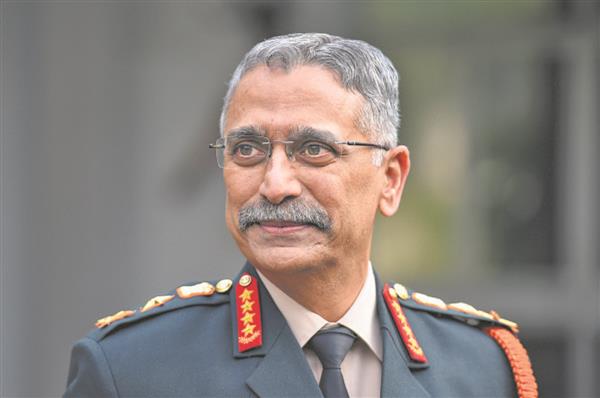
Gen MM Naravane, Army Chief
Ajay Banerjee
Tribune News Service
New Delhi, February 24
Even as there has been visible disengagement of Indian and Chinese troops along a section of the Line of Actual Control in eastern Ladakh, the de-escalation and deinduction — which means pulling back troops and war equipment to the pre-April 2020 home bases — have not yet begun in the area.
At the commander-level meet on Saturday, the two sides did discuss phased de-escalation and deinduction, but there has been no forward movement on the two issues, sources told The Tribune, adding that “it could take more talks as a lack of trust exists for now”.
Catering for redeployment
The two sides don’t want to pull back to locations from where redeployment, in case of an exigency, could take time, say sources.
The first phase of the disengagement process commenced on February 10 with simultaneous withdrawal by both sides from both banks of the Pangong Tso, a 135-km-wide glacial lake. The matters of disengagement at Depsang, Gogra or Hot Springs are likely to come up in subsequent talks.
Army Chief Gen MM Naravane, speaking at an event of a think tank in New Delhi on Wednesday, sounded a word of caution: “We still have a long way to go. We now have to go on to the stage of de-escalation, then deinduction of troops. We have to be wary and cautious.”
A senior functionary explained that it was a clear case of lack of trust, hence the two militaries didn’t want to pull back to locations from where redeployment, in case of an exigency, could take time.
The present positions of troops, tanks or guns are not face to face but they are within striking range of artillery fire and from where rapid redeployment is possible.
General Naravane too spoke about the lack of trust, saying that “there is trust deficit with China and we will be watching Chinese moves closely”.
Some of mistrust stems from statements of the Chinese Ministry of Defence as well as the Ministry of Foreign Affairs in Beijing, which tried to wrongly blame India for the Galwan clash on June 15 last year. The statements had come on February 19, indicating that China was under pressure from its domestic audience, which has no access to international media or opinion.
China is in the habit of creeping and making very small incremental changes along the LAC where each change by itself doesn’t appear to be very big or worthy of a strong reaction, said the Army Chief.
Bharatiya Kisan Union president Naresh Tikait. PTI file
Barabanki (UP), February 24
Bharatiya Kisan Union president Naresh Tikait on Wednesday called Defence Minister Rajnath Singh a “caged parrot” and said the farmers’ issues could be resolved if he is given the freedom to talk with them.
He accused the BJP-led central government of being “stubborn” over the three new laws, which farmer unions want repealed. The protesting farmers too are not ready to go back on their demands, he said.
“The government has made Defence Minister Rajnath Singh a caged parrot (‘pinjre ka tota’). If he is given the freedom to talk to farmers, I can guarantee that there would be a decision and the BJP’s prestige will also remain intact,” he said.
He said farmers respect the Defence Minister, but he is not given a chance by the government to deal with the farmers’ issue.
Tikait addressed a farmers’ “mahapanchyat” here and also spoke to reporters, claiming that the Centre was not paying heed to the farmers protesting against the laws.
“The government is stubborn and is not ready to hear out farmers. It should change its attitude,” the BKU leader said.
“If the PM is not ready to repeal the laws, we are also not going to backtrack. The farmers are ruined and not getting the right price for their produce. The rise in prices of power, petrol and diesel has affected them also,” he said.
“If this government continues for long, farmers will have to abandon agriculture,” added.
The BKU leader said the way to Uttar Pradesh’s Purvanchal is through Barabanki and if farmers here are made aware of the impact of the new laws, they will be able to tell farmers in that region about it.
“This government is defaming farmers, labelling them as terrorists and Khalistanis and we will not remain silent on this,” he said.
Tikait indicated that he had no quarrel with Union Minister Sanjeev Balyan, whose supporters and those of the Rashtriya Lok Dal clashed recently over the farmers’ protests.
He indirectly referred to the riots in western Uttar Pradesh in 2013, over which Balyan too had faced charges.
“Earlier Hindus and Muslims lived in amity. But from 2013, BJP spread misconceptions among them and divided society. But now people have understood their tricks,” the BKU leader said.
Thousands of farmers have been camping at the border of Delhi since November-end, demanding the repeal of the new agri-marketing laws. They claim that the laws will weaken the minimum support price (MSP) system, an argument that the government rejects. PTI
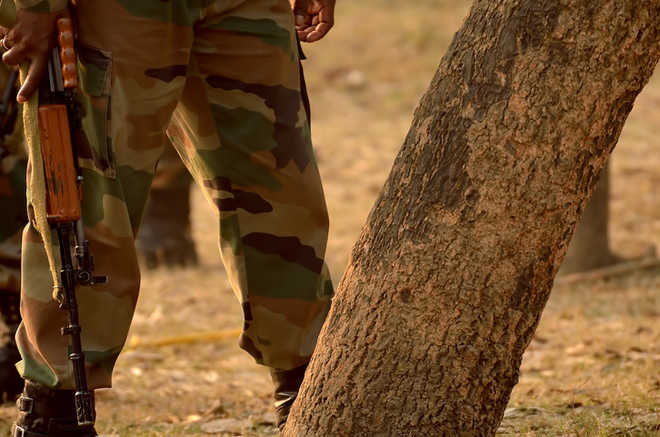
hoto for representation only. Source: iStock.
Vijay Mohan
Tribune News Service
Chandigarh, February 24
In a move that resolves a long pending anomaly related to grant of benefits to the kin of posthumously decorated armed forces personnel, the Punjab Government has extended the benefits to the families of those awarded peace time gallantry medals before 2017.
The state government had instituted an “Honour and Gratitude” policy in 2000, offering government jobs to families of posthumous gallantry awardees as per their qualifications.
However, due to an oversight, the policy had only included war-time gallantry awards and had left out peace time awards even if those happened to be higher in precedence.
Param Vir Chakra, Maha Vir Chakra and Vir Chakra, are classified as war-time medals and are awarded for gallantry in the face of the enemy, while Ashok Chakra, Kirti Chakra and Shaurya Chakra are peace time medals for acts of courage other than in the face of the enemy.
The policy was finally rectified in the year 2017, but the authorities concerned had interpreted the amendment to mean that family members of only those personnel would be eligible who were awarded after the year 2017 whereas the original policy of the year 2000 did not contain any such cut-off date.
The rectification of the anomaly remained pending with the government since 2017.
In December 2020, the Punjab and Haryana High Court had directed the government to take appropriate measures and introduce clarity in the policy within a period of three months.
The fresh policy issued this week now includes all ‘Chakra’ series awards in its ambit without any cut-off provision as to the date of the award. The applicant, however, needs to be within the prescribed age limits for the job that he or she is applying for.
Sources familiar with the matter said that although the number of affected applicants may not be very high, the rectification of the anomaly is a huge morale booster both for past and future cases and indicates the commitment of the government in resolving such issues, adding that the policy was amended well before the time provided by the High Court.
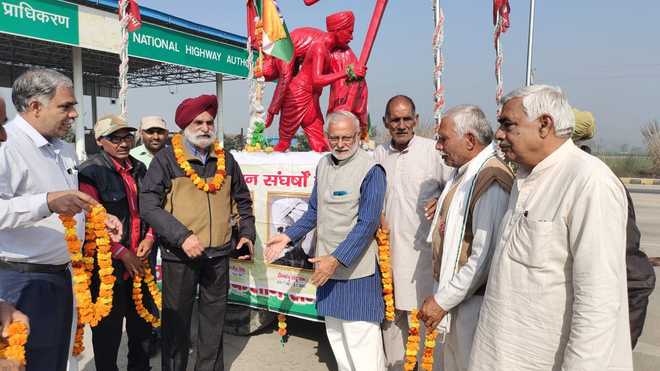
Farmers welcome Shaheed Bhagat Singh’s nephew Prof Jagmohan Singh in Rohtak on Wednesday.
Tribune News Service
Jhajjar, February 24
Shaheed Bhagat Singh’s nephew Prof Jagmohan Singh today demanded release of all farmers arrested by the Delhi Police during the tractor parade on January 26 and withdrawal of cases registered against farmers during the three-month-long protest.
He raised the demands at a programme organised by the All-India Kisan Sabha (AIKS) at the Rohad toll plaza on the Rohtak-Delhi national highway. The event was organised to mark the “Daman Virodhi Diwas”.
“The Modi government is pro-corporate. It becomes evident by its stance on the three contentious farm laws. The Centre is adamant on not revoking the legislations. The arrest of farmers is unjustified. They must be released immediately, while the police repression against farmers should come to an end,” said Prof Jagmohan, who is an agricultural economist.
Inderjit Singh, state vice-president, AIKS, said the “Daman Virodhi Diwas” was observed with enthusiasm, giving out the message that protesters were angry.
Earlier, Prof Jagmohan was welcomed with slogans of “Shaheed Bhagat Singh Zindabad” at the Rohad toll plaza. He was garlanded at the Madina toll plaza in Rohtak district.
At the Tikri border, protesting farmers marked the “Daman Virodhi Diwas” by criticising the Centre for alleged repression against protesting farmers.
Kaithal/Karnal: Farmers today pasted a memorandum of demands on the premises of the Kaithal DC’s office after they were informed that the DC was absent.
They demanded opening of all entry points to Delhi.
In Karnal, farmers handed over a memorandum of demands to the tehsildar.
Panipat: Members of the BKU and other organisations led by Sunil Dutt and Bintu Malik held a protest march to mark the “Daman Virodhi Diwas”. They later submitted a memorandum to tehsildar Kuldeep Malik.
Another from Punjab dies
Sonepat: A-65-year-old farmer from Hoshiarpur district died at the Singhu border on Wednesday. The deceased has been identified as Malkeet Singh. When he did not wake up in the morning, fellow protesters took him to the general hospital, where doctors declared him as brought dead. The police said the farmer might have died of a heart stroke. tns
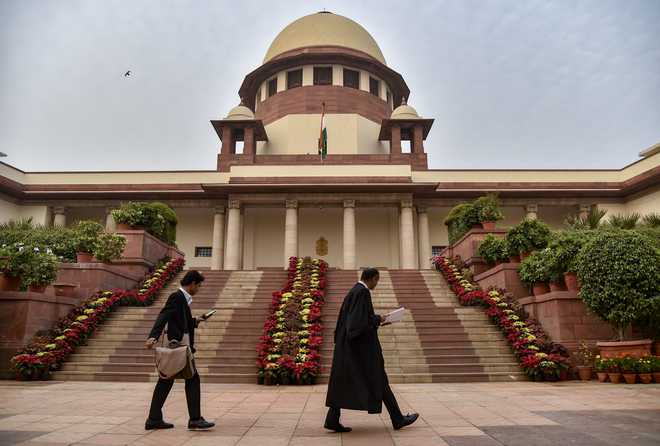
File photo of the Supreme Court.
New Delhi, February 24
The Supreme Court on Wednesday made clear that it cannot modify its verdict directing the Centre to consider granting permanent commission to women officers in the Army by entertaining individual grievances, that too almost a year after its pronouncement.
The top court, in its landmark verdict delivered on February 17, 2020, had asked the Centre to consider all serving Short Service Commission (SSC) women officers for permanent commission irrespective of them having crossed 14 years or, as the case may be, 20 years of service.
“We will not tinker with our judgement on the basis of such miscellaneous applications that too after one year. We cannot be looking into individual cases and start modifying our judgement. There is something called judicial discipline,” a Bench of Justices DY Chandrachud and MR Shah said.
The Bench, however, granted the counsel for Lt. Col. (Retd.) Priamvada A Mardikar, to approach the Armed Forces Tribunal with her grievances.
It also asked senior advocate R Balasubramanian, appearing for the Defence Ministry, to use his “good office” in trying to get the grievances of the former Army officer resolved.
“I will certainly use my good office to ensure that her issue is considered,” the lawyer assured the Bench during the hearing conducted through video conferencing.
The court noted the arguments of lawyer SS Pandey, appearing for the former woman officer, that there were two similarly-placed officers and one of them was granted the permanent commission and the second was denied and she later retired.
The lawyer said it was held by the top court in the verdict that the women officers, who retired during the pendency of the case, will be getting the retirement benefits as commissioned officers.
Permanent commission has been granted to Short Service Commissioned officers in all the ten streams of the Indian Army including Army Air Defense (AAD), Signals, Engineers and Army Aviation.
Justice Chandrachud had authored the last year verdict which had said that as a one-time measure, the benefit of continuing in service until the attainment of 20 years pensionable service shall also apply to all the existing SSC officers with more than fourteen years of services.
It had held that the option of grant of permanent commission shall be given to all women SSC officers and if those with more than 14 years of service do not opt for it then they will be entitled to continue in service until they attain 20 years of pensionable services.
While granting permanent commission to women officers in Army, it had rejected the Centre’s stand of their physiological limitations as being based on “sex stereotypes” and “gender discrimination against women”.
The top court had accepted the Centre’s policy of February 25, 2019 to grant permanent commission to SSC women officers in all the 10 streams in the Army.
The top court had said SSC women officers with over 20 years of service who are not granted permanent commission shall retire on pension in terms of policy decision.
It had noted that Indian Army has sanctioned 50,266 posts for officers, while the posts currently occupied are 40,825 including 1,653 by women officers.
It had noted that there is a shortage of 9,441 officers in the Indian Army. — PTI
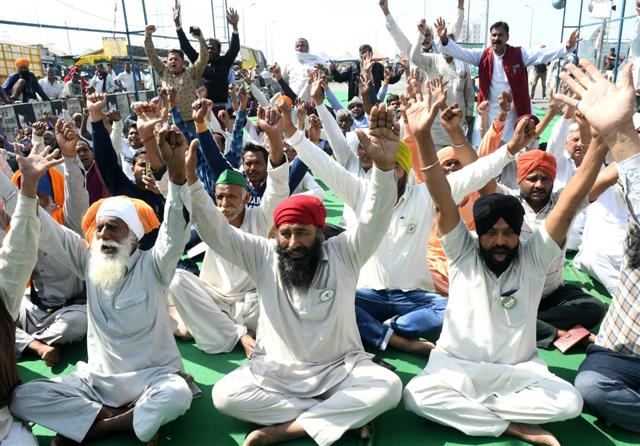
Farmers sitting during their ongoing protest over Centre’s new farm laws at Ghazipur border in New Delhi on Wednesday. Tribune photo: Manas Ranjan Bhui
New Delhi, February 24
The Samkyukta Kisan Morcha on Wednesday wrote to President Ram Nath Kovind demanding “unconditional” release of arrested farmers and withdrawal of “false” cases in connection with the stir against the agri laws.
In its letter, the Morcha, an umbrella body of farmer unions agitating against the three central laws, also said notices allegedly being sent by police and other investigating agencies to the protesting farmers should be stopped.
“Under the banner of Samkyukta Kisan Morcha, farmers have been staging sit-in around Delhi for the last three months, but hundreds of farmers and agitation supporters have been lodged in jails by the Government of India and many state governments and false cases have been registered against them,” stated the letter shared by the SKM.It said that “innocent” farmers should be released from jails without any condition.
The letter was sent to the President as protesting farmer unions observed the day as “Daman Pratirodh Diwas”.
Meanwhile, the SKM welcomed the release of climate activist Disha Ravi, arrested by the Delhi Police in the toolkit case earlier this month.
On Tuesday night, Ravi was released from Tihar Jail hours after a city court granted her bail.
“SKM welcomed many observations made by judge Dharmender Rana in his orders,” it stated.
“SKM demanded immediate action against the Delhi Police which flouted many norms and arrested Disha Ravi in an illegal and extra-constitutional manner,” the statement stated.
Thousands of farmers, mostly from Punjab, Haryana and western Uttar Pradesh, have been camping at the three Delhi border points of Singhu, Ghazipur and Tikri since late November to press for a complete repeal of three farm laws and a legal guarantee on the minimum support price for crops.
Scores were arrested when protesters taking part in a tractor rally on January 26 deviated from the path, clashed with the police and stormed the Red Fort. PTI
Army Chief Gen M M Naravane. Tribune file photo
New Delhi, February 24
The disengagement of armies of India and China from north and south banks of Pangong Tso is a “very good end result” and a win-win situation for both the sides, Army Chief Gen M M Naravane said on Wednesday, stressing that there are strategies in place to address other pending issues in eastern Ladakh.
He said there were no signs of an “overt collusion” between China and Pakistan during the Ladakh standoff but India also caters to a long term strategy for not a two, but a two-and-half front war. With the half front, he was referring to the internal security.
He said right from the beginning of the standoff, all sides on the Indian side worked together.
Be it at the political level, Defence Minister Rajnath Singh and External Affairs Minister S Jaishankar spoke to their Chinese counterparts, he said.
“We were all in it together. We had our plan chalked out which we had discussed on what should be the way forward. Whatever has panned out, has happened as a result of that. What we have achieved so far is very good,” Naravane said at a webinar organised by Vivekanada International Foundation.
The advice which was given by National Security Adviser also came in extremely handy and his insight into strategic level affairs definitely helped us chalking out the response, the Army chief said.
“As a result of this whole approach, this disengagement has taken place. I think it is a very good end result. It is a win-win situation. For any agreement to last, both sides should feel that they have achieved something. I think a good outcome that has resulted out of the 10 rounds of talks which have taken place so far,” he said.
Last week, armies of the two countries concluded withdrawal of troops and weapons from north and south banks of Pangong Tso in the high-altitude region.
Naravane said there are some issues which remain in the area of Depsang, in the area of eastern Ladakh and in other areas along northern border.
“…But we have our strategies in place for that. Do we have anything to negotiate in future? Yes, definitely we have. But I would not, of course, for obvious reasons, what those strategies would be to further and progress our negotiations and come out with a favourable outcome.” PTI
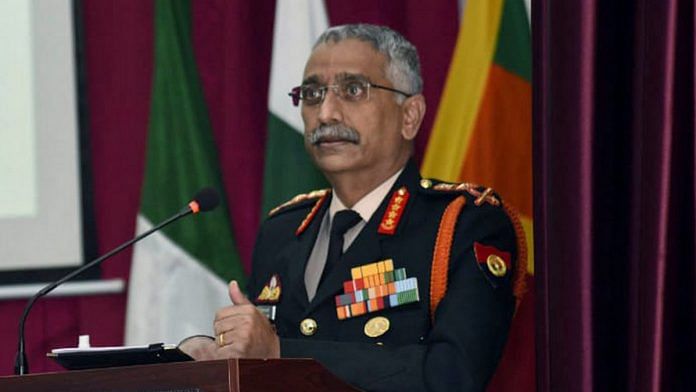
New Delhi: China has realised that its habit of creeping forward and achieving its aim without firing a shot or suffering casualties will not work with India, said Army chief General M.M. Naravane Wednesday.
“China has been in the habit of creeping forward, making small incremental changes…and because of these small incremental moves, which has never been contested, it has been able to achieve its aim without firing a shot or suffering casualties. We have shown that this strategy will not work with us and every move will be met resolutely,” said Gen Naravane, while addressing a webinar.
Speaking for the first time on the issue since India and China completed the disengagement process at the Pangong Tso in Ladakh last week, Naravane said that whatever has been achieved so far was “very good”.
He credited the disengagement to the approach taken by entire government machinery —political, diplomatic and economic besides the military — and advice by National Security Advisor Ajit Doval.
“We (government machinery) were all in it together. We had our plan chalked out which we had discussed what should be the way forward. Whatever has panned out has happened as a result of that,” said Naravane at a webinar organised by Vivekananda International Foundation (VIF), a New Delhi-based think tank.
He added: “What we have achieved so far is very good. Having a number of meetings…the advice given by the NSA came handy and his insight into strategic matters, helped us.”
He further noted that the disengagement was a “win-win” situation for both India and China, and for any agreements to last both sides should feel that they have achieved something.
“To that end, this is a good outcome of the 10 rounds of talks,” the Army chief said, referring to the 10 rounds of Corps Commander level talks that were held between India and China.
During his address, Gen Naravane also noted that while the disengagement process has been completed, the Army continues to be cautious and wary.
“There is a trust deficit and unless it is removed, we will continue to be wary and watchful of all kinds of movements. At end of the day, we have achieved a lot.”
He said the disengagement agreement signed with China is premised on the fact that it will be observed in letter and spirit, as is the case with any agreement signed with another country.
“We will trust but we will verify. We have put our systems in place to ensure there is no re-occupation of the heights (southern and northern banks). It is part of the agreement and we can only hope that PLA will adhere to it in toto,” said Naravane.
He further highlighted that certain issues remain pending between the two countries, and the Army had strategies in place for them.
“We have our strategies in place for that. Do we have anything to negotiate? Yes, we definitely have, but I can’t say what those strategies will be, to again come out with a favourable outcome.”
Also read: India, China discuss 4 friction points, including Demchok, at Corps Commander talks
The Army chief also spoke about China’s tactics of creeping with small incremental changes without any casualty or firing a shot. He noted that China has been similarly creeping forward in the South China Sea.
This tactic by China is known as ‘salami slicing’ in the strategic community and refers to the Chinese taking over territory inch by inch over years.
In September 2017, then Army chief and present Chief of Defence Staff General Bipin Rawat had cautioned against this.
“Salami slicing, taking over territory in a very gradual manner, testing our limits of threshold is something we have to be wary about and remain prepared for situations emerging, which could gradually emerge into conflict…,” Rawat had said.
According to Naravane, even after disengagement the military is prepared for a two-and-a-half front war.
“These are threats in being. Whether they manifest or not…We should prepare for the worst but hope for the best,” he said, adding that plans are in place to defend the primary and secondary front.
The Army chief also said that over the years, India has focused primarily on the western front than the northern front but this will change now.
Naravane further noted that there was “no overt sign” of any collusion between Pakistan and China during the Ladakh stand-off and whatever they were doing, they continued to do.
“There was no large mobilisation that would say any help is being given,” he said.
He added that the Ladakh stand-off showed India’s resolve in maintaining its interest foremost.
On India’s relationship with China going forward, the Army chief said, “Our relationship with China would develop along the road that we wish to develop. We will like to have peace and tranquility on the border and all other engagement will continue… nobody wants an unsettled border.”
Naravane also highlighted that India wants peaceful ties with all neighbours and stressed on the need to have settled borders.
Also read: How financial powers to command heads will help Army, Navy, IAF

























































